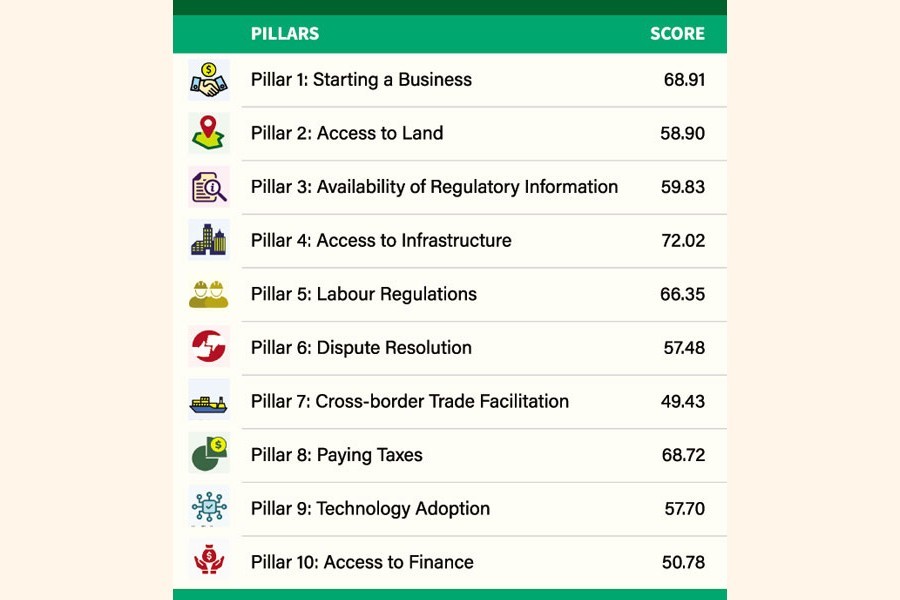Bangladesh scores 61 out of 100 points in its first-ever homegrown business index called BBX, showing modest improvements in doing-business environment.
The BBX (Bangladesh Business Climate Index), based on a total of 100 points, divides the business environment into four categories. The bottom 0-20 points indicate the business environment is difficult, if 21-40, there are substantial bottlenecks remaining for business. Index staying within the next 20 points indicates generally complex business environment.
If the index is between 61 and 80, the business environment is improving and if the index is 81-100, then the business environment is friendly. The first-ever 'Bangladesh Business Environment Index' could manage to score 61.01, which states the business environment in Bangladesh is improving, but there is room for progress.
This is more or less similar to that of World Bank's 'doing business index' which now discontinued over audit report of the data controversy. However, BBX is contextualized to Bangladesh.
Metropolitan Chamber of Commerce and Industry, Dhaka (MCCI) and Policy Exchange Bangladesh (PEB) jointly unveiled the survey-based report on Thursday. It may be released annually.
Bangladesh has best performed in access to infrastructure out of its 10 pillars as it obtained 72.02 score. The worst pillar is cross-border trade facilitation where the country scored 49.43.
MCCI and Policy Exchange Bangladesh have developed the BBX specifically for Bangladesh, assessed overall business climate and ecosystem as well as the strengths and weaknesses in 10 areas relating to the setting up and operation of businesses in Bangladesh, across industrial, geographical and business-size matrices.
The performances of Bangladesh in 10 areas are: pillar 1: starting a business 68.91, pillar 2: access to land 58.90, pillar 3: availability of regulatory information 59.83, pillar 4: access to infrastructure 72.02, pillar 5: labour regulations 66.35, pillar 6: dispute resolution 57.48, pillar 7: cross border trade facilitation 49.43, pillar 8: paying taxes 68.72, pillar 9: technology adoption 57.70 and pillar 10: access to finance 50.78.
The objective is to visualise what appropriate policy measures and reforms need to be brought about to continually improve Bangladesh's business climate, which is already on the path of improvement.
The Index will help potential investors and policymakers to target action programs to address specific issues.
During the first such Index-launching programme, held on online platform, adviser to the Prime Minister on Private Industry and Investment Salman F. Rahman joined it as chief guest.
MCCI President Ms Nihad Kabir chaired the session. Executive Chairman at Bangladesh Investment Development Authority (BIDA) Md. Sirajul Islam was special guest.
Speaking as the chief guest on the occasion, Mr. Salman F. Rahman said that this index has covered the business environment not only in Dhaka and Chattagram but in the whole of Bangladesh.
He hopes that being detailed and effective research methodology, this indicator will soon gain acceptance among global entrepreneurs.
He said doing-business index usually covers only the metropolitan areas. "This is not perception-based but reality-based index."
BIDA executive chairman Mr. Islam said that despite World Bank's announcement to stop publishing its flagship doping-business report, his agency, however, has been continuing its activities to improve the country's business environment. He assured that the initiative of the MCCI and PEB would further accelerate the BIDA activities.
He said: "This will broaden the areas for improving the business environment."
He, however, said the reform efforts taken in the context of World Bank-sponsored doing-business index will continue.
Ambassador of Japan to Bangladesh Mr. ITO Naoki said that Japan is providing financial and technical assistance to various megaprojects, including metro-rail, to improve the infrastructure, transportation and communications system of Bangladesh.
"Once these projects are completed, the business environment in the country will be further improved."
While presenting the keynote Dr. Masrur Reaz said: "First, it shows that the country has made significant progress in its development journey to middle-income/LDC graduation."
He said the second is macro success has filtered down to micro achievements
"Bangladesh is gradually developing a meaningful administrative and production support system in several areas," he told the meet.
The third is: there is an unfinished policy agenda, especially in terms of improving trade facilitation, finance barriers, and facilitation of technology adoption that are further inhibiting the expansion of both small and large businesses.
The fourth is regulatory and institutional improvements will need to be continually made to ease the business environment for entrepreneurs on an ongoing basis.
Speaking on the occasion, President of the Federation of Bangladesh Chambers of Commerce and Industry (FBCCI) Mr. Md. Jashim Uddin said the discontinuation of the publication of World Bank's Ease of Doing Business made it difficult for entrepreneurs to plan for future investments.
He said the initiatives by the MCCI and PEB would help government agencies to remove business barriers, and would facilitate achieving SDGs and Vision 2041.
President of Dhaka Chamber of Commerce and Industry Mr. Rizwan Rahman said that collateral-based lending system is a major problem for financing in Bangladesh.
He said this is homegrown index.
The panel discussion was attended by president of the Foreign Chamber of Commerce and Industry (FICCI) Mrs Rupali Haque Chowdhury, former President of MCCI Mr. Syed Nasim Manzur, chairperson at the BUILD Mr. Abul Kasem Khan.
Bangladeshi business counselors from different countries also spoke at the event.
Closing remarks were made by Senior Vice President at the MCCI Mr. Anis A. Khan.
The methodology of the survey is survey/sampling. Weighted average for divisions and sectors based on contributions to GDP and employment. It has reached 1000 firms, 451 total response and 356 high-quality responses.
There are such more indices in neighbouring countries. China has China Business Climate Index, Malaysia has Business Condition Index and Vietnam has got Business Climate Index.


